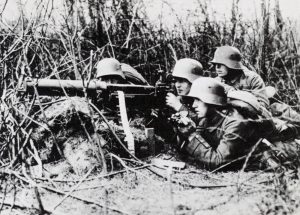 In World War I Imperial Germany faced the daunting task of fighting Great Britain, France, and Russia (replaced in 1917 by the United States) at the same time. Mindful of the unfairness inherent in passing judgment in hindsight, we can usefully ask whether Germany might have won the war even against these odds had it not made too many serious mistakes. “What if?” history of this sort can help us understand better what actually happened, and it can provide precautionary lessons for the future. Here is a list of key German mistakes, omitting errors at the battlefield level, in this colossal human tragedy.
In World War I Imperial Germany faced the daunting task of fighting Great Britain, France, and Russia (replaced in 1917 by the United States) at the same time. Mindful of the unfairness inherent in passing judgment in hindsight, we can usefully ask whether Germany might have won the war even against these odds had it not made too many serious mistakes. “What if?” history of this sort can help us understand better what actually happened, and it can provide precautionary lessons for the future. Here is a list of key German mistakes, omitting errors at the battlefield level, in this colossal human tragedy.
 Many Germans have earnestly sought to overcome the Nazi past by publicizing its depredations, by acknowledging wrongdoing, by seeking restitution of stolen property, and by maintaining a respectful, responsive stance toward Jews in general and Israel in particular. Still, such is the burden of the Holocaust that another approach may also prove attractive to certain Germans. It involves Yiddish.
Many Germans have earnestly sought to overcome the Nazi past by publicizing its depredations, by acknowledging wrongdoing, by seeking restitution of stolen property, and by maintaining a respectful, responsive stance toward Jews in general and Israel in particular. Still, such is the burden of the Holocaust that another approach may also prove attractive to certain Germans. It involves Yiddish.
While Yiddish contains elements of Hebrew and Slavic languages, it is mainly an old dialect of German. A German speaker can understand most of it, and in fact Yiddish forms part of the study of German linguistics and literature, correctly understood. This means that a simple initiative could help bring Germans and Jews closer.
